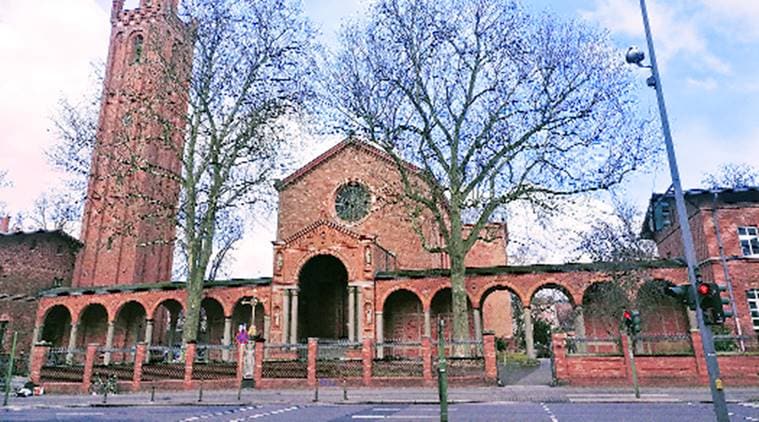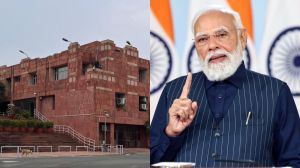Room with a View
In Berlin, a mosque finds a home in a Protestant church.
 Keeping Faith St Johanniskirche church, on Berlin’s Alt-Moabit, houses the Ibn Rushd-Goethe mosque. (Source: Moeena Halim)
Keeping Faith St Johanniskirche church, on Berlin’s Alt-Moabit, houses the Ibn Rushd-Goethe mosque. (Source: Moeena Halim)
Witten by Moeena Halim
AN 1835 Venetian Gothic church, with its copper-topped steeple, on Berlin’s Alt-Moabit, tells many a tale. Today, it finds itself in the midst of a Turkish-dominated neighbourhood with the Moabit prison and an imposing courthouse on one side and Kleiner Tiergarten (a state park) on the other. Air raids during the World War II had severely damaged the structure. Rebuilt in the 1950s, St Johanniskirche holds some fascinating stories in its pockets. One such is the mosque within.
Last June, human rights lawyer and activist Seyran Ates set up the Ibn Rushd-Goethe Mosque in a room inside the Protestant church’s building in an effort to mobilise and integrate liberal Muslims into the German society. The fight, however, for creating such a space was riddled with obstacles. “There would be Muslim gay men who were thrilled at being accepted for who they were but didn’t agree with women praying without a headscarf,” says Marlene Löhr, press officer, Ibn Rushd-Goethe Mosque.
The mosque, open on Fridays and Sundays during prayer time, is named after the medieval Andalusian Arab Islamic philosopher Ibn Rushd and the German poet and thinker Johann Wolfgang Goethe, known for his affinity to the Muslim faith. Berlin has a sizeable Muslim population, but finding a space to host their gatherings was difficult. Support came from the church, which appealed to the other Protestant churches across Berlin to let out unused rooms as well, says Löhr, who converted to Islam six-seven years ago. The choir at St Johanniskirche shifted its practice from the room, where the mosque stands, to inside the church.
The church is a 20-minute walk or a seven-minute bus ride from the Berlin Hauptbahnhof railway station. Or, just hire a cab, for €10-22, from the nearest airport, Tegel, and reach in 15 minutes.
The mosque, at the north-western end of the building, has an entrance separate from the church. Bathed in natural light pouring in from the large arched windows, the sparsely decorated space is carpeted in white to match the stark walls and ceiling. A half-moon wooden structure indicates the direction of the Kaaba — towards which the faithful bow in prayer. At the other end of the room is a humble library of theological books. The room may be small but promises to accommodate all: “Not only men and women, but also the various directions of Islam, such as Sunnis, Shiites, Alevis and other orientations of Islam, as well as people of all legal sexual orientations and identities, should be fully equal in all respects,” states the mosque’s website. Discussions resolved the initial friction caused by members’ different styles of prayer.
On Fridays, the mosque hosts a big prayer and a khutbah or sermon. Sometimes, the priests from the church are in attendance too, just the way the members of the mosque often attend the Sunday mass. Anyone with enough knowledge on a topic can take the sermon of the week at the mosque. Topics like the history of Islam in Germany, the Golden Age of Islam, and what it means to find the “right path” have been popular in the past.
The mosque — with an Imam of Pakistani origin and a little shy of 100 members — is open about homosexuality, allowing women to lead prayers, encouraging men and women to pray together. There is no insistence on the headscarf, even during prayer. Löhr says there are accounts of women leading prayers during Prophet Muhammad’s time. Two of his wives were known to have lead the prayer in their neighbourhood. “These were mixed congregations. These reports are now hidden because powerful men do not want the world to know,” she says.
The mosque plans on inviting Jamida Teacher, the woman who led prayers at a Kerala mosque, to the mosque’s first anniversary in June. The mosque has also extended support and legitimised inter-religious marriages through nikah. For liberal Muslims the world over, it is indeed a welcome move.
Moeena Halim is a Mumbai-based freelance writer.
Around Town
Landmarks in the area
* Tiergarten: Berlin’s answer to Hyde Park or Central Park. One of Germany’s largest urban gardens.
* Victory Column: An iconic Berlin monument built to commemorate the Prussian victory in the Danish-Prussian War.
* Reichstag: Part of the city’s historic edifice, the parliament building’s roof terrace and dome are tourist hotspots that offer spectacular views of the city.
* Bellevue Palace: The President’s stately residence, situated on the banks of the River Spree.
- 01
- 02
- 03
- 04
- 05































